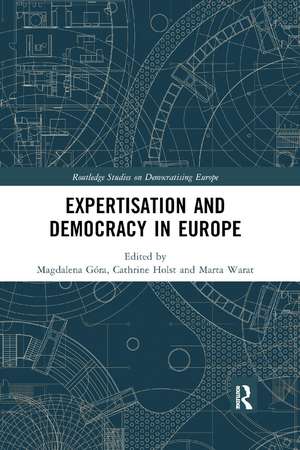Expertisation and Democracy in Europe: Routledge Studies on Democratising Europe
Editat de Magdalena Góra, Cathrine Holst, Marta Waraten Limba Engleză Paperback – 12 dec 2019
The book explores and assesses new and old linkages between knowledge, expertise and democracy, and expands and deepens the current debates by addressing questions such as: What is the role of expertise in Europe? How is knowledge of different kinds embedded in and decisive for democratic practice in contemporary democracies? How are we to assess recent transformations of the expert-citizens and government-civil society relationships from the perspective of democracy, and which paths are viable in the years to come? Finally, the book engages with and gives flesh to the notion of expertisation not only as a broad political and societal diagnosis, but also as a multidimensional and deeply contested process that enfolds in concrete practices and institutional settings.
This text will be of key interest to scholars and students of European studies, European and European Union politics, democracy, public policy, international relations, sociology, gender studies and media studies.
Toate formatele și edițiile
| Toate formatele și edițiile | Preț | Express |
|---|---|---|
| Paperback (1) | 259.92 lei 6-8 săpt. | |
| Taylor & Francis – 12 dec 2019 | 259.92 lei 6-8 săpt. | |
| Hardback (1) | 764.20 lei 6-8 săpt. | |
| Taylor & Francis – 30 noi 2017 | 764.20 lei 6-8 săpt. |
Preț: 259.92 lei
Preț vechi: 311.39 lei
-17% Nou
Puncte Express: 390
Preț estimativ în valută:
49.74€ • 51.31$ • 41.50£
49.74€ • 51.31$ • 41.50£
Carte tipărită la comandă
Livrare economică 27 martie-10 aprilie
Preluare comenzi: 021 569.72.76
Specificații
ISBN-13: 9780367885878
ISBN-10: 0367885875
Pagini: 242
Dimensiuni: 156 x 234 mm
Greutate: 0.45 kg
Ediția:1
Editura: Taylor & Francis
Colecția Routledge
Seria Routledge Studies on Democratising Europe
Locul publicării:Oxford, United Kingdom
ISBN-10: 0367885875
Pagini: 242
Dimensiuni: 156 x 234 mm
Greutate: 0.45 kg
Ediția:1
Editura: Taylor & Francis
Colecția Routledge
Seria Routledge Studies on Democratising Europe
Locul publicării:Oxford, United Kingdom
Public țintă
Postgraduate and UndergraduateCuprins
Introduction: Expertisation and Democracy in Europe [Magdalena Góra, Cathrine Holst and Marta Warat]
1. Exploring the Connection between Knowledge and Democracy [Christopher Lord]
2. Reassessing the Monnet Method: Technocratic or Deliberative? [John. R. Moodie]
3. The Expertisation of Stakeholder Involvement in EU Policy Making [Åse Gornitzka and Eva Krick]
4. The European Commission Expert Groups – More than Expertise [Silje Hexeberg Tørnblad]
5. The Role of Think Tanks and Experts in Legitimisation of the European Neighbourhood Policy [Magdalena Góra]
6. The Role of Expertise in the European Refugee Crisis [Espen D. H. Olsen]
7. Unpacking Gender Expertise: The Case of the European Women’s Lobby [Helena Seibicke and Cathrine Holst]
8. Uneasy Relation: Gender Expertise and Gender Equality Policy in Poland [Marta Warat]
9. The Media as Public Intermediaries of Knowledge in Europe: From Deliberation to Democratic Legitimation [Asimina Michailidou and Hans-Jörg Trenz]
10. Why Does Democracy Need Participation? Participatory Budgeting in Medellin, Colombia and Krakow, Poland [Anna Bednarczyk and Inga Hajdarowicz]
Afterward: Democratic Theory, Knowledge Theory and Institutional Design: Lessons From Europe [Cathrine Holst]
1. Exploring the Connection between Knowledge and Democracy [Christopher Lord]
2. Reassessing the Monnet Method: Technocratic or Deliberative? [John. R. Moodie]
3. The Expertisation of Stakeholder Involvement in EU Policy Making [Åse Gornitzka and Eva Krick]
4. The European Commission Expert Groups – More than Expertise [Silje Hexeberg Tørnblad]
5. The Role of Think Tanks and Experts in Legitimisation of the European Neighbourhood Policy [Magdalena Góra]
6. The Role of Expertise in the European Refugee Crisis [Espen D. H. Olsen]
7. Unpacking Gender Expertise: The Case of the European Women’s Lobby [Helena Seibicke and Cathrine Holst]
8. Uneasy Relation: Gender Expertise and Gender Equality Policy in Poland [Marta Warat]
9. The Media as Public Intermediaries of Knowledge in Europe: From Deliberation to Democratic Legitimation [Asimina Michailidou and Hans-Jörg Trenz]
10. Why Does Democracy Need Participation? Participatory Budgeting in Medellin, Colombia and Krakow, Poland [Anna Bednarczyk and Inga Hajdarowicz]
Afterward: Democratic Theory, Knowledge Theory and Institutional Design: Lessons From Europe [Cathrine Holst]
Notă biografică
Magdalena Góra is an Associate Professor at the Institute of European Studies, Jagiellonian University in Kraków, Poland.
Cathrine Holst is Research Professor at ARENA Centre for European Studies and Professor at the Department of Sociology and Human Geography, University of Oslo, Norway.
Marta Warat is Associate Professor at the Institute of Sociology, Jagiellonian University in Kraków, Poland.
Cathrine Holst is Research Professor at ARENA Centre for European Studies and Professor at the Department of Sociology and Human Geography, University of Oslo, Norway.
Marta Warat is Associate Professor at the Institute of Sociology, Jagiellonian University in Kraków, Poland.
Descriere
This book provides a much-needed account of the role and re-organization of expertise and expert knowledge in Europe and the European Union in a broad range of policy spheres, contributing to the debate triggered by the recent crises.














